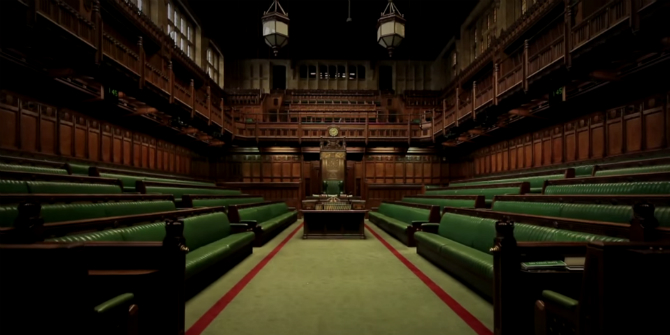 Once Brexit is put into effect, human rights guarantees offered by the EU will cease to apply. This loss of human rights protection will be mitigated as long as the UK continues to be a member of the European Convention on Human Rights. Solon Solomon asks whether the time has come for the UK to leave also the European Court of Human Rights.
Once Brexit is put into effect, human rights guarantees offered by the EU will cease to apply. This loss of human rights protection will be mitigated as long as the UK continues to be a member of the European Convention on Human Rights. Solon Solomon asks whether the time has come for the UK to leave also the European Court of Human Rights.
The announcement that legislation will be enacted to address the gaps that will emerge after Brexit in a whole range of different fields – spanning from agriculture, trade to the imposition of international sanctions – brings to the forefront the impact Brexit will have on human rights. Once Brexit is put into effect, the guarantees for human rights protection offered by the EU Charter of Fundamental Rights will cease to apply.
At the same time, the impact on the status of human rights protection in the United Kingdom will be mitigated as long as the country continues to be a member of the European Convention on Human Rights and to the European Court of Human Rights. Although plans for repealing the Human Rights Act 1998 were not included in the Queen’s speech, nothing can preclude that the change in circumstances will not see the UK leaving the Strasbourg jurisdiction too. This is possible for two main reasons
First, David Lidington, the new Secretary of State for Justice, has demonstrated in the past his willingness to repeal the Act. Secondly, such a step should be considered possible based on the prominent role security issues will come to play once the dust over the forthcoming Brexit negotiations subsides. The Prime Minister has expressed her willingness to rip up human rights legislation if needed on national security grounds and the European Court of Human Rights could potentially pose an obstacle to her plans. The Court has clashed with the United Kingdom in the past in a number of issues, ranging from prisoners’ voting rights to stop and search, and the UK has threatened already in the past to quit the Court’s jurisdiction in the realms of the Abu Qatada case, where the country was not let by the Court to extradite Abu Qatada to Jordan without receiving diplomatic assurances.
The Tories included in their manifesto the pledge to enact a British Bill of Rights, but reports in the press have hinted that the Prime Minister will abandon such plans after Brexit. If the UK leaves the European Court of Human Rights, this will create a legislative normative gap which courts will be called to fill in. This would run contrary to the idea of Brexit, namely the return of national sovereignty to the people. In Israel, which like the United Kingdom does not have a single written document as its constitution nor a Bill of Rights, in what has been termed as the ‘constitutional revolution’, the country’s Supreme Court has intervened many times in order to ascertain rights – like the right to equality – which has been included in Israel’s Declaration of Independence but not as a right per se in another piece of legislation.
Moreover, even if such a British Bill of Rights were to be considered an option after Brexit, its enactment should not be seen as a simple, non-time consuming procedure. Human rights express first and foremost social and class tensions. Under the particular synthesis of the current Parliament, with a minority Conservative government in place, it is difficult to fandom how legislation on human rights could not be passed without ferocious debates regarding both the character of these rights as well as their content. Such tensions could, for example, emerge in the form of the question of whether or not socio-economic rights should be included in a Bill of Rights. Initially deemed to be non-justiciable, such rights have found now their place as legal norms, yet their exact place in a cardinal legal document such as a constitution is still disputed. For example, the New Zealand Bill of Rights implements only the civil and political rights contained in the International Covenant on Civil and Political Rights, although New Zealand has equally ratified also the International Covenant on Economic, Social and Cultural Rights. In the constitution of India socio-economic rights constitute ‘guidelines’ whereas, in the realms of the EU Charter of Fundamental Rights, the European Court of Justice has seen in paragraph 45 of the AMS case these rights as entailing more measures in order to be rendered fully effective.
The difficulties that would erupt in the enactment of a British Bill of Rights are demonstrated also through the example of the Israeli legal reality, where efforts to draft a constitution and a Bill of Rights have been going on unsuccessfully since the country’s establishment due to the political and social fractions.
Leaving the jurisdiction of the Strasbourg court would bring legal uncertainty
Leaving the jurisdiction of the Strasbourg court would bring legal uncertainty to the UK. This brings us to the next question, namely whether if it were conceded that staying in the Court’s jurisdiction would better serve the country’s national interest, the UK would be able to address the contemporary security challenges inside the existing framework of the European Convention on Human Rights. I believe it would. First of all, if the UK were to file a derogation statement under article 15 of the Convention, there is no reason to assume that as in past cases, the Court would not be ready to accept the legality of such a declaration. Secondly, even if the UK opts not to derogate and take some measures against terrorist threats, it is plausible to assume that their legality could be equally accommodated. In the Hassan judgment, concerning the application of Article 5 regarding detention in times of warfare, the Court demonstrated how human rights law can be reconciled with the laws of war beyond a derogation framework.
At the same time, it has to be conceded that while the debate over anti-terrorist measures involving extensive surveillance, arrests and detentions can be accommodated by revisiting the relevant discussions and arguments posed before both the House of Lords and the European Court of Human Rights in cases like these of Gillian or Belmarsh, recent terrorist attacks represent a challenge to Strasbourg in terms of the legality of police actions during a rampage. Article 2 of the Convention permits the use of force in self-defence as long as such use is proportional. In the wake of the London attacks, where eight policemen fired 50 bullets against the terrorists, the proportionality debate could enter the realms. The London police took pains to argue that the policemen were caught by surprise and thought the terrorists had real and not hoax suicide vests.
This rhetoric of the police caught in surprise and not being able to assess correctly the real parameters in place is highly reminiscent of the arguments in the McCann case. There, yet with a considerable minority opinion, the UK was held accountable for its agents shooting and killing an IRA terrorist out of the mistaken perception that he had a gun and he would fire at them.
Nevertheless, the transplanting of the McCann debate to the exigencies posed by the latest terrorist attacks misses the point to the extent that in the realms of the current terrorist attacks, force is not used in order for policemen to defend themselves, but as the only way to halt an otherwise unceasing attack against defenceless civilians. The nature of the attacks, as well as the asymmetry in the possession of weaponry between the attacker and the attacked, render the analysis on the legality of the police force in the classic, Article 2 terms, completely unsatisfactory, without making such an analysis totally irrelevant. Along these lines, what is needed is a dynamic interpretation of the existing provisions and on this account, the practice of other states facing similar incidents could be helpful.
 Council of Europe in Strasbourg, France. Image by francois schnell, (Flickr), licenced under CC BY 2.0.
Council of Europe in Strasbourg, France. Image by francois schnell, (Flickr), licenced under CC BY 2.0.
A dynamic interpretation should not be precluded; only recently, implicitly responsive to the security concerns of certain countries seeing their asylum request mechanisms overwhelmed by the waves of asylum seekers entering Europe, the Advocate General of the European Union’s court held that the Dublin Regulation arrangements, stipulating that the asylum request should be filed in the first safe country of entrance, could also accommodate scenarios in which the application was first lodged in a country outside the EU.
In a world of legal complexities, the challenge for human rights lies in their ability to be seen not as vehicles for the imposition of an authoritarian state authority, but as able to encompass the understanding that modern situations lie in a grey area that calls for new, legally creative solutions, without rupturing the existing legal framework. To the extent that the Strasbourg court sticks to this task, the new UK government can have no excuse for leaving the Court’s jurisdiction and plunging the country into further isolation.
This post represents the views of the author and not those of the Brexit blog, nor the LSE.
Solon Solomon is a visiting lecturer at King’s College London Dickson Poon School of Law.







The European Court of Human Rights has also shown itself to be not immune to bias. On 23 November, L’Avvenire, an Italian newspaper close to the Catholic church, published an interview with Guido Raimondi, the Court’s president, titled “Refugees: let Europe not repeat the mistake it made with the Shoah”.
He seems to be encouraging or even inviting applications to his Court. He is quoted as saying:
“We were expecting an avalanche of cases, but so far this has not happened. Not yet at least. Probably because asylum procedures are still ongoing in the countries concerned. But the Court is already well equipped for the probable cases, and to manage the litigation has elaborated a series of clear and easily applicable principles.”
Furthermore, the president seems to deny a State’s right to defend itself by strengthening its frontiers with walls:
“So far there is no open file on Calais but probably we shall have one … States are free to regulate migration flows, but from this to creating walls that could give rise to serious violations and emergencies, there’s a difference … In the case of all these phenomena we shall be very attentive to evaluate the violations of human rights that might be submitted to our judgment”.
So States are being told that the Court is readying itself to weaken their ability to defend their land frontiers, as it has already done in the case of sea frontiers with its controversial judgment in Hirshi Jamaa and others v Italy (23 February 2012).
In 2008 Italy and Libya concluded a treaty providing for cooperation between their respective vessels to return to Libya illegal immigrants found travelling in boats in the direction of Italy. Some Somali and Eritrean nationals challenged this before the European Court of Human Rights which declared such actions to be in violation of the European Convention on Human Rights.
In the Hirshi Jamaa case several organisations intervened to oppose Italy’s position. These included two United Nations agencies – the offices of the high commissioners for Refugees (UNHCR) and Human Rights (UNHCHR) – Human Rights Watch, the Columbia Law School Human Rights Clinic, the AIRE Centre, Amnesty International and the International Federation for Human Rights. Lobbies matter, numbers speak and public relations help.
The Court, not having – and not expected to have – any expertise of its own on the circumstances of non-member States, has often used information from non- (and sometimes anti-) government organisations as established truth. Indeed, in paragraph 118 of its judgment it states: “ … as regards the general situation in a particular country, the Court has often attached importance to the information contained in recent reports from independent international human rights protection associations such as Amnesty International…”. Again, in paragraphs 123 and 125 it states: “It notes that the numerous reports by international bodies and non-governmental organisations …” and “…conditions that outside visitors, such as delegations from UNHCR, Human Rights Watch and Amnesty International, could only describe as inhuman.”
In other words, the Court, that is expected to be both independent and impartial, based its judgment on that of independent organisations that were far from being impartial if only because they were interveners in the very same case. In judgments relating to refugees and immigrants one sometimes gets the impression that the Court considers itself as the NGOs’ judicial arm. That may explain why its Hirshi Jamaa judgment reads like the case for the prosecution.
At least in judgments relating to refugees and immigrants, the Court has applied very generously the dictum that the Convention is a living instrument and each extension of its power is used as justification for the next.